
When it began in 2000, SEPTA's Market Street Elevated Reconstruction Project, an effort to replace 11,000 feet of elevated subway on the Market-Frankford Line, seemed to be on the right track.
But plans since then have derailed, thanks to construction challenges and contractor disputes.
Originally scheduled for completion this November at a cost of $420 million, SEPTA now expects the project, taking place between 46th Street and Millbourne Station on Market Street, to take more than a year longer and cost nearly $710 million.
And the prospect of another year of construction has some West Philadelphia businesses worried.
"It's a little better now, but people avoid the area because cars sometimes have difficulty driving through the congestion and construction," said Mohammed Ghafary of Philadelphia Halal Chicken near 52nd and Market streets. "Business is not like before."
SEPTA spokesman Gary Fairfax said the complexity of the project created obstacles.
"We have to coordinate the street closures, shuttle rerouting and construction all while trying to keep the system open," he said. "Things don't always go as planned."
Weather problems and disputes with contractors also caused delays, Fairfax said.
"One of the contractors that was on the project had to be replaced," he said, adding that rising prices for concrete and fuel drove up the overall cost of the project.
When completed in December 2008, the project will "open up the street significantly and brighten up the area," Fairfax said.
Meanwhile, the effect on Penn students working on community-service programs in the area should prove minimal, said Eleanor Sharpe, one of the associate directors of the Center for Community Partnerships.
"It hasn't affected any of our programming," she said. "We try and provide transportation for all the students anyway, so they don't have to worry about using mass transportation."
City and Regional Planning Department professor Rachel Weinberger said that the project's delays and cost overruns are a symptom of an underfunded transit system.
"Transit agencies are funded in short-term bites and one-year promises, and when you apply for funding, you're not allowed to assume inflation costs," she said. "So projects always take longer and cost more than anybody predicts."
Weinberger added that inadequate maintenance of existing mass transit adds to construction problems.
"These kinds of projects often get put off longer than they should be," she said. "Reconstruction of an elevated line is disruptive and expensive, but you have to do it."
And while Ghafary believes the project is necessary, he just wishes that SEPTA would finish the project as soon as possible.
"A lot of people nearby have closed their shops because the construction harmed their business too much," he said. "People cannot live with continual construction."
The Daily Pennsylvanian is an independent, student-run newspaper. Please consider making a donation to support the coverage that shapes the University. Your generosity ensures a future of strong journalism at Penn.
DonatePlease note All comments are eligible for publication in The Daily Pennsylvanian.





